

QR National rides rails to 22pc rise. Coalition’s radical new federalism. Federal Coalition finance and deregulation spokesman Andrew Robb said much of the bureaucracy that had grown up in recent years was designed to do no more than “leave a paper trail, to cover backsides”.
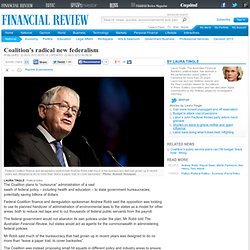
Photo: Arsineh Houspian Laura Tingle Political editor The Coalition plans to “outsource” administration of a vast swath of federal policy – including health and education – to state government bureaucracies, potentially saving billions of dollars. Federal Coalition finance and deregulation spokesman Andrew Robb said the opposition was looking to use its planned handover of administration of environmental laws to the states as a model for other areas, both to reduce red tape and to cut thousands of federal public servants from the payroll. The federal government would not abandon its own policies under the plan, Mr Robb told The Australian Financial Review, but states would act as agents for the commonwealth in administering federal policies. Buffett and the rest of us. Why Australian technology start-ups don’t need to go to Silicon Valley. Poster girl ... 21-year-old Sydney entrepreneur Nikki Durkin spent six months in Silicon Valley wooing prospective investors in her 99dresses online fashion market place, but she’s moved back to Australia to enjoy a lower cost of doing business.
Photo: Hugh Hamilton Nikki Durkin was the poster girl for the “brain drain”. In May, the ambitious 21 year old was the face of a front page article in the Sydney Morning Herald, that blamed risk-averse Australia financiers for driving technology entrepreneurs overseas. Durkin was moving to Silicon Valley in the United States and taking her online fashion marketplace, 99dresses, with her. Put down the razor and give your staff a chance. Suncorp to pay special dividend as profit surges. Suncorp transformation delivers premium return. Suncorp Rewards Shareholders Yet Misses Forecasts. Suncorp Group will pay a bonus dividend to its shareholders after posting a 60 per cent rise in full year profit.
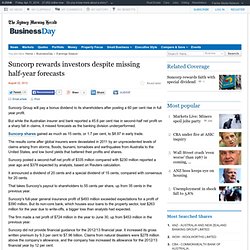
Suncorp ponders ClearView tilt. Suncorp rules out ‘fire sale’ of non-core bank assets. Suncorp bid to win back faith of its investors. Subdued lending growth has hit the banking arm.
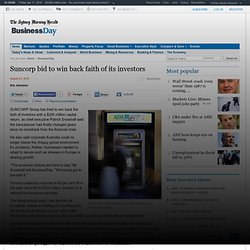
Snowball warns of low bond yields. Lifting the lid on QBE’s black box. Resources projects ‘envy of world’ Il faut en finir avec la gabegie alimentaire. Cet été, il a fait très chaud et sec aux Etats-Unis ; une sécheresse historique qui a touché 60 % du pays, et le Mexique.
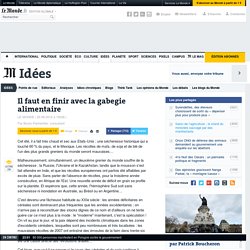
Les récoltes de maïs, de soja et de blé de l'un des plus grands greniers du monde seront mauvaises… Malheureusement, simultanément, un deuxième grenier du monde souffre de la sécheresse : la Russie, l'Ukraine et le Kazakhstan, tandis que la mousson s'est fait attendre en Inde, et que les récoltes européennes ont parfois été affaiblies par excès de pluie. Sans parler de l'absence de récoltes, pour la troisième année consécutive, en Afrique de l'Est. Une nouvelle année de déficit en grain se profile sur la planète. Et espérons que, cette année, l'hémisphère Sud soit sans sécheresse ni inondation en Australie, au Brésil ou en Argentine… Cet hiver, que va-t-il se passer si le cours des céréales et du soja continue à flamber ?
Une bonne partie des 920 millions de mal-nourris, en tout cas ceux qui habitent dans les grands bidonvilles du monde, vont avoir encore plus faim. Too much of a good thing. Brian Toohey Although Australia is only the world’s 13th biggest economy, thanks largely to compulsory superannuation it has the fourth-biggest funds management industry but this could now be hurting productivity.
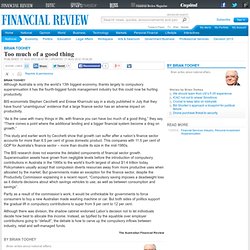
BIS economists Stephen Cecchetti and Enisse Kharroubi say in a study published in July that they have found “unambiguous” evidence that a large finance sector has an adverse impact on productivity. “As is the case with many things in life, with finance you can have too much of a good thing,” they say. BHP’s $US20bn dam buster. Marius Kloppers in London after delivering a 35 per cent drop in BHP’s profit.
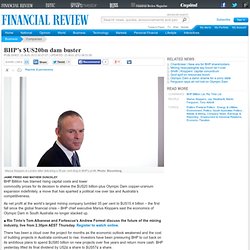
Photo: Bloomberg Jamie Freed and Mathew Dunckley BHP Billiton has blamed rising capital costs and lower commodity prices for its decision to shelve the $US20 billion-plus Olympic Dam copper-uranium expansion indefinitely, a move that has sparked a political row over tax and Australia’s competitiveness. BHP’s Olympic Dam decision a damn shame for a sorry state. Wilkie’s plan to fine and pillory bad banks. Local banks still great innovators. Citi and CBA: a tale of two banks. Battered Bendigo chops executive bonuses. Big four accountants slash partner appointments. Agnes King New partner appointments at the nation’s biggest accountancy firms have fallen 25 per cent, due to tough trading conditions and a poor global economic outlook.
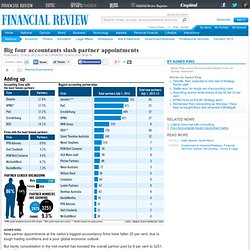
But hectic consolidation in the mid-market has boosted the overall partner pool by 9 per cent to 3251, at the 20 largest accounting firms. Qantas cancels $US8.5bn aircraft orders. Telstra cuts 651 call centre positions. John McDuling Telstra is planning to shed 651 call centre jobs and has admitted more positions could be at risk as customer service inquiries are increasingly handled online.
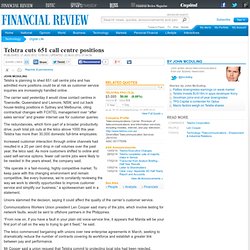
The carrier said yesterday it would close contact centres in Townsville, Queensland and Lismore, NSW, and cut back house-testing positions in Sydney and Melbourne, citing contractual changes with FOXTEL management over “after sales service” and greater internet use for customer queries. The redundancies, which form part of a broader productivity drive, push total job cuts at the telco above 1000 this year. Woolies posts first net profit fall since 1999. Yes, bonds are a risky investment too. Kevin Davis Christopher Joye argues that the investment strategies of Australian super funds, with their heavy weighting towards equity, have been built on shaky foundations.
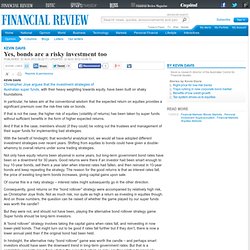
In particular, he takes aim at the conventional wisdom that the expected return on equities provides a significant premium over the risk-free rate on bonds. If that is not the case, the higher risk of equities (volatility of returns) has been taken by super funds without sufficient benefits in the form of higher expected returns. Strategists urge caution in yield focus. Snowball warns of low bond yields. Don’t get tripped up chasing dividends. David Potts There are good dividend pickings to be had despite the prospect of a subdued reporting season. The trouble is, with interest rates so low, everybody has the same idea. “The market is focused on yield this year, which is not the usual case,” says Johan Carlberg, lead portfolio manager of Alphinity Investment Management. Low bond yields pressure IAG income. Interest Rate Risk In 2012: With Low Rates Persisting, Insurance Companies Try To Muddle Through.
Dividend Stocks May Be Next Bubble as Retirees Search for Higher Yields. German Insurers Buy Junk Corporate Loans to Overcome Low Rates. German insurers, which came through the subprime mortgage crisis largely unscathed, are seeking to boost investment returns by buying junk loans to corporate borrowers. Senior secured loans, which are repaid first in a default, are originated by banks for borrowers considered high yield or high risk as they usually have a significant level of debt relative to equity.
The loans are then are sold on to investors. Those loans, with interest margins of as much as 700 basis points above benchmark lending rates, are attracting German insurers struggling to improve investment returns amid the low interest-rate environment. Turnbull defends broadband investment. Malcolm Turnbull was drawn into a debate about his belief in FTTH broadband after he invested in France Telecom Louie Douvis Paul Smith The government has attacked the Coalition’s support for a British-style high-speed broadband scheme by invoking a former BT executive’s claims that the UK system was “one of the biggest mistakes humanity has made”.
Infrastructure Minister Anthony Albanese cited former British Telecom chief technology officer Peter Corcoran in decrying the opposition’s planned fibre to the node proposal, outlined in The Australian Financial Review on Tuesday. Sacre bleu! French FTTP costs compared to Australia. Turnbull defends broadband investment. $1bn price tag put on super reforms. APRA apprehensive about life insurers. Big super funds unite to attack reform plan. Sally Patten Several big superannuation funds are trying to derail plans to end the preferential access by union-backed super schemes to billions of dollars of savings. AustralianSuper, Australia’s biggest industry super fund with $46 billion of assets and more than 1.9 million members, said the plan, which the government will consider, would drive more employees’ savings into underperforming, high-cost funds.
BT revamps to focus on super. Economic growth set to improve: Westpac. US drought will ignite inflation, warns HSBC. ANZ chief calls for end to anti-foreign sentiment.